Subtotal:
$100.00

Product
What ALDACTONE is used for?
ALDACTONE is used to treat,
Congestive heart failure
Nephrotic syndrome (a kidney disorder)
Liver cirrhosis with fluid retention (oedema) and swelling of the abdomen (ascites)
A cancerous disease with swelling of the abdomen (malignant ascites)
Or diagnose primary aldosteronism (a condition where excess hormone is produced)
Warning And Precautions
Talk to your doctor before taking this medicine, if you:
Are allergic to spironolactone or any of the other ingredients in this medicine
Have diabetes
Have Addison’s disease (weakness, loss of energy, low blood pressure and dark pigmentation of the skin)
Have kidney problems which may be severe or worsening
Have high blood levels of potassium
Have a diet high in potassium
Have low blood levels of sodium
Have liver cirrhosis
Have been passing small amounts of urine
Have an inherited disorder of the red blood pigment haemoglobin causing skin blisters, abdominal pain and nervous system disorders (porphyria)
Have abnormal periods or swollen breasts
ALDACTONE should not be taken if you are breast-feeding
If you are pregnant or planning to become pregnant, speak to your doctor before taking this medicine
ALDACTONE may cause dizziness or drowsiness. Make sure you are not affected before you drive or operate machinery
Interactions
Tell your doctor if you are taking,
Blood pressure lowering medicines such as captopril or enalapril, valsartan or losartan
Chlorpropamide (used in diabetes)
Digoxin (used in some heart conditions)
Ciclosporin or tacrolimus (used to prevent organ transplant rejection, treat rheumatoid arthritis, eczema or psoriasis)
Fludrocortisone (a corticosteroid)
Warfarin (used to thin the blood)
Other potassium-sparing diuretics
Lithium (used for some mental illnesses)
Indomethacin and mefenamic acid used for pain
Potassium supplements (potassium salts)
Noradrenaline (norepinephrine) (used for low blood pressure or heart problems)
An anaesthetic
Carbenoxolone (an ulcer healing drug)
Trimethoprim and trimethoprim-sulfamethoxazole used as antibiotic
Always take this medicine exactly as your doctor has told you
Swallow the tablet with water
Directions and For Use
Adults
Congestive heart failure – 100mg a day. The maintenance dose is 25-200mg a day. In difficult or severe cases, up to a maximum of 400mg a day may be taken
Nephrotic syndrome – 100-200mg a day
Liver cirrhosis with fluid retention and swelling of the abdomen – 100-400mg a day. Your doctor will decide on the best maintenance dose for you
A cancerous disease with swelling of the abdomen – 100-200mg a day. In severe cases, up to a maximum of 400mg a day may be taken
Primary aldosteronism diagnosis – Long test: 400mg a day for 3-4 weeks. Short test: 400mg a day for 4 days
Primary aldosteronism treatment – 100-400mg a day in preparation for surgery
What is ALDACTONE?
ALDACTONE contains Spironolactone which belongs to a group of medicines called potassium-sparing diuretics (water tablets), which help you lose excess fluid from your body
Congestive heart failure – 100mg a day. The maintenance dose is 25-200mg a day. In difficult or severe cases, up to a maximum of 400mg a day may be taken
Nephrotic syndrome – 100-200mg a day
Liver cirrhosis with fluid retention and swelling of the abdomen – 100-400mg a day. Your doctor will decide on the best maintenance dose for you
A cancerous disease with swelling of the abdomen – 100-200mg a day. In severe cases, up to a maximum of 400mg a day may be taken
Primary aldosteronism diagnosis – Long test: 400mg a day for 3-4 weeks. Short test: 400mg a day for 4 days
Primary aldosteronism treatment – 100-400mg a day in preparation for surgery
Children
Usual starting dose is 3mg per kg of body weight a day, to be taken in divided doses. Your doctor will adjust the dose depending on the response to treatment
If you take more ALDACTONE
If you take more ALDACTONE at the same time, contact your nearest hospital casualty department or tell your doctor immediately
Symptoms of an overdose include drowsiness, mental confusion, dizziness, diarrhoea, decreased blood levels of sodium, increased blood levels of potassium (symptoms include ‘pins and needles’ or tingling, unusual tiredness or weakness, muscular weakness, paralysis with a loss of muscle tone, muscle spasm)
If you forget to take ALDACTONE
If you forget to take a dose, take it as soon as you remember it and then take the next dose at the right time
Do not take a double dose to make up for a forgotten dose
If you stop taking ALDACTONE
Consult your doctor before you stop taking ALDACTONE
Side Effects
Like all medicines, ALDACTONE can cause side effects, although not everybody gets them.
High blood levels of potassium (muscle twitching or weakness, irregular heartbeat, unusual tiredness or weakness, paralysis with or without loss of muscle tone, circulatory failure), especially if you have impaired kidney function or a diet high in potassium
An allergic reaction such as swelling of the face, lips, tongue or throat, difficulty breathing or swallowing, shock, collapse, skin rash or itching
Severe form of skin rash with flushing, fever, blisters or ulcers (Stevens-Johnson syndrome)
Increased bruising, nosebleeds, sore throats or infections
Low blood levels of sodium, changes in the levels of chemicals in the body
Lack of muscle control or coordination, drowsiness, dizziness, headache, clumsiness tiredness, confusion
Impaired liver function, a poisonous effect on the liver
Stomach upset, inflammation of the stomach lining, bleeding in the stomach, stomach or intestinal ulcers, stomach cramps, diarrhea
Bone softening due to vitamin D deficiency, leg cramps
Acute kidney failure particularly in those who already have impaired kidney function
Enlarged breasts in men, changes in voice pitch, reduced sexual potency in men, decreased sexual ability/drive, breast tenderness, breast lumps and increased hair growth in females, irregular periods, sweating
Storage
Store at room temperature (15-25ºC)
Keep this medicine out of reach of children
Do not use this medicine after the expiry date

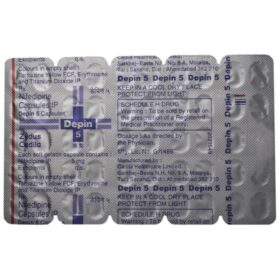


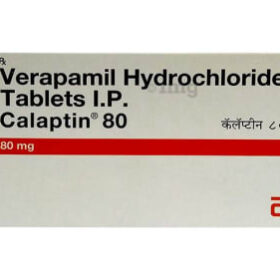
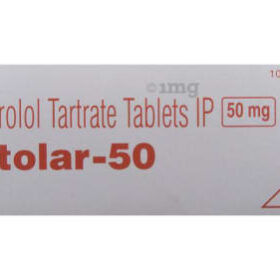
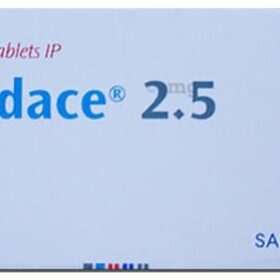

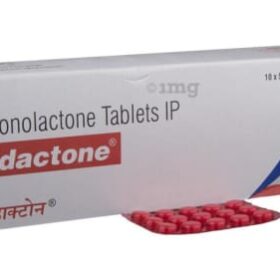

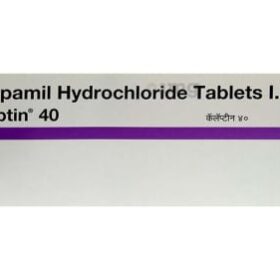
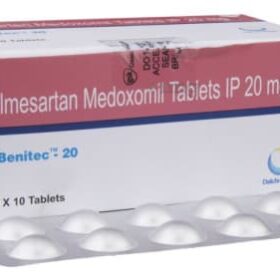
Reviews
There are no reviews yet.